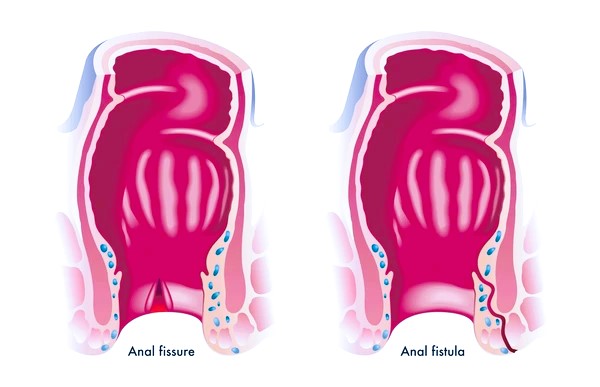Fissures: Symptoms, Causes, Treatment, and Precautions
Learn about fissures: symptoms, causes, treatment options, and precautions. Stay informed to effectively manage and prevent this painful condition. #fissures


Symptoms of Fissures
A fissure is a small tear or cut in the lining of the anus. It can cause discomfort and pain, especially during bowel movements. Common symptoms of fissures include:
Sharp pain during and after bowel movements
Bright red blood on toilet paper or in the toilet bowl
Itching and irritation around the anus
A visible tear or crack in the skin around the anus
Constipation or difficulty passing stools
Causes of Fissures
Fissures can be caused by several factors, including:
Passing hard or large stools
Chronic constipation
Diarrhea
Straining during bowel movements
Inflammatory bowel disease
Pregnancy and childbirth
Anal intercourse
Treatment for Fissures
Treatment for fissures aims to relieve symptoms, promote healing, and prevent recurrence. The following treatment options are commonly recommended:
Sitz baths: Soaking the affected area in warm water for 10-15 minutes, several times a day, can help alleviate pain and promote healing.
Dietary changes: Consuming a high-fiber diet, drinking plenty of water, and avoiding foods that can cause constipation can help soften the stools and make bowel movements easier.
Topical ointments or creams: Over-the-counter creams containing anesthetics or steroids can provide temporary relief from pain and reduce inflammation.
Stool softeners: Taking over-the-counter stool softeners can help prevent straining during bowel movements and reduce the risk of further injury.
Botox injections: In some cases, Botox injections may be recommended to relax the muscles around the anus and promote healing.
Surgical intervention: If conservative treatments fail to provide relief, surgery may be necessary to repair the fissure or remove the scar tissue.
Precautions for Fissures
To prevent the occurrence or recurrence of fissures, it is important to take the following precautions:
Maintain good hygiene: Keep the anal area clean and dry to prevent infection.
Avoid excessive wiping: Use gentle, unscented toilet paper or wipes to avoid further irritation.
Avoid straining during bowel movements: If you are experiencing constipation, try using a stool softener or increasing your fiber intake to make bowel movements easier.
Stay hydrated: Drink an adequate amount of water daily to keep stools soft and prevent constipation.
Exercise regularly: Engaging in regular physical activity can help improve digestion and prevent constipation.
Avoid irritants: Avoid using harsh soaps, perfumed products, or products containing alcohol in the anal area, as they can further irritate the skin.
It is important to consult a healthcare professional if you suspect you have a fissure or if your symptoms persist despite home remedies. They will be able to provide a proper diagnosis and recommend the most appropriate treatment for your condition.
